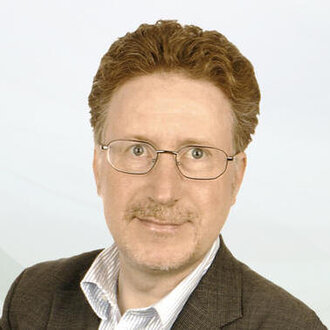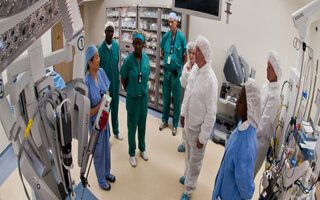Kiel Institute Researcher
Dr. Michael Stolpe

Kiel Institute Researcher
Dr. Michael Stolpe
Michael Stolpe is a senior economist at the Kiel Institute for the World Economy, in Germany, leading its project on the global health economy. He was also a full member of the DFG Cluster of Excellence “Inflammation at Interfaces,” completed in 2018, and now serves as a founding member of the DFG Cluster of Excellence "Precision Medicine," one of the world’s leading research collaborations on chronic inflammatory processes in the human body, associated with a wide range of diseases whose prevalence is rapidly increasing in many industrialized countries.
Michael Stolpe serves as co-speaker and research lead of the focus area “pandemic management” within the new interdisciplinary Leibniz Lab “Pandemic Preparedness” that mobilizes experts from 41 Leibniz Research Institutes to create evidence-based policy advice in preparation for and reaction to future pandemics.
Michael Stolpe is also a partner and principal investigator in the peer-reviewed interdisciplinary Leibniz Research Alliance “INFECTIONS in an Urbanizing World – Humans, Animals, Environments (InfUrb)” where his contribution addresses the economics of antimicrobial resistance. In addition, he is a founding partner and principal investigator in the new Leibniz Research Alliance “Resilient Ageing” where he contributes novel health investment models to study how people’s individual capacity for adaptive responses to exogenous health shocks depends on the way healthcare systems, health technology investments and aggregate health-related risks are managed.
Michael Stolpe’s overall research portfolio is focused on health inequalities, health investments over the lifecycle, early retirement and pension policy, the social costs of HIV/AIDS, medical decision making, methods of economic evaluation, and innovation in medical technology and practice. He has additional research experience in finance, international economics and economic growth. As a policy advisor, Michael Stolpe has provided expertise to national governments around the world and key international organizations, such as the European Medical Research Councils, the European Commission and the International Monetary Fund.
During his time at the Kiel Institute, Michael Stolpe has previously headed various research groups on technology policy, innovation and economic growth, served as a visiting scholar at the National Bureau of Economic Research in Cambridge, Massachusetts, and partnered with leading scholars at the universities of Oxford, Warwick, Rome and the United Nations University in Maastricht in a multi-year EU-funded research collaboration on “European Integration, Financial Systems and Corporate Performance.”
Michael Stolpe is an associate editor of Humanities and Social Sciences Communications, an interdisciplinary journal, published by Springer Nature, for peer-reviewed academic research across the full spectrum of social sciences and the humanities. Since 2011, Michael Stolpe has also served as an Editorial Board Member of the Health Economics Review. He continues to teach health economics at the University of Kiel. His research has been recognized with various awards for research excellence.
Topics
Welfare StateEuropeGermanyBehavioral EconomicsTax PolicyInternational TradeInnovation and Structural ChangeHealthGrowthGlobalizationFiscal Policy & National BudgetsFinancial MarketsDigitalizationMain research interests
- venture capital
- technological innovation and technology policy
- public finance
- medical decision making
- international economics
- Global Health
- financial markets
Contact
Further Affiliations
- Michael Stolpe is a Founding Member of the DFG-funded Cluster of Excellence "Precision Medicine" at the Universities of Kiel and Lübeck and the Leibniz Research Centre at Borstel
- Michael Stolpe is a Full Member of the DFG-funded Cluster of Excellence “Inflammation at Interfaces” at the Universities of Kiel and Lübeck and the Leibniz Research Centre at Borstel
Michael Stolpe is a senior economist at the Kiel Institute for the World Economy, in Germany, leading its project on the global health economy. He was also a full member of the DFG Cluster of Excellence “Inflammation at Interfaces,” completed in 2018, and now serves as a founding member of the DFG Cluster of Excellence "Precision Medicine," one of the world’s leading research collaborations on chronic inflammatory processes in the human body, associated with a wide range of diseases whose prevalence is rapidly increasing in many industrialized countries.
Michael Stolpe serves as co-speaker and research lead of the focus area “pandemic management” within the new interdisciplinary Leibniz Lab “Pandemic Preparedness” that mobilizes experts from 41 Leibniz Research Institutes to create evidence-based policy advice in preparation for and reaction to future pandemics.
Michael Stolpe is also a partner and principal investigator in the peer-reviewed interdisciplinary Leibniz Research Alliance “INFECTIONS in an Urbanizing World – Humans, Animals, Environments (InfUrb)” where his contribution addresses the economics of antimicrobial resistance. In addition, he is a founding partner and principal investigator in the new Leibniz Research Alliance “Resilient Ageing” where he contributes novel health investment models to study how people’s individual capacity for adaptive responses to exogenous health shocks depends on the way healthcare systems, health technology investments and aggregate health-related risks are managed.
Michael Stolpe’s overall research portfolio is focused on health inequalities, health investments over the lifecycle, early retirement and pension policy, the social costs of HIV/AIDS, medical decision making, methods of economic evaluation, and innovation in medical technology and practice. He has additional research experience in finance, international economics and economic growth. As a policy advisor, Michael Stolpe has provided expertise to national governments around the world and key international organizations, such as the European Medical Research Councils, the European Commission and the International Monetary Fund.
During his time at the Kiel Institute, Michael Stolpe has previously headed various research groups on technology policy, innovation and economic growth, served as a visiting scholar at the National Bureau of Economic Research in Cambridge, Massachusetts, and partnered with leading scholars at the universities of Oxford, Warwick, Rome and the United Nations University in Maastricht in a multi-year EU-funded research collaboration on “European Integration, Financial Systems and Corporate Performance.”
Michael Stolpe is an associate editor of Humanities and Social Sciences Communications, an interdisciplinary journal, published by Springer Nature, for peer-reviewed academic research across the full spectrum of social sciences and the humanities. Since 2011, Michael Stolpe has also served as an Editorial Board Member of the Health Economics Review. He continues to teach health economics at the University of Kiel. His research has been recognized with various awards for research excellence.





